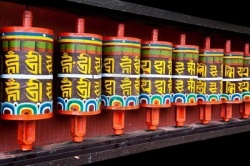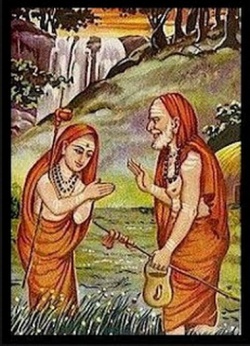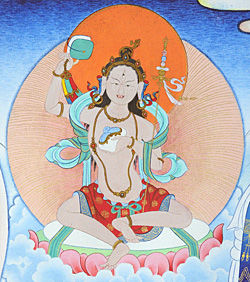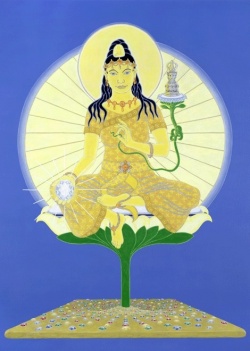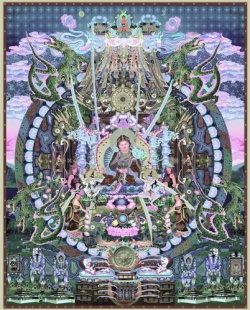The Assembly of Arhats
Sutra:
…Elders Shariputra, Mahamaudgalyayana, Mahakasyapa, Mahakatyayana, Mahakausthila, Revata, Suddhipanthaka, Nanda, Ananda, Rahula, Gavampati, Pindola Bharadvaja, Kalodayin, Mahakapphina, Vakkula, Aniruddha, and others such as these, all great disciples;
Commentary:
Elder is a term used to show respect for another’s position. There are three kinds of elders:
1) Elders in age,
2) Elders in the Dharma Nature,
3) Elders in blessings and virtue,
An elder in age has lived for many years. A Dharma Nature elder understands the Buddhadharma and comprehends his selfnature; regardless of his age, he is nonetheless an elder in terms of his wisdom and intelligence. One such as this may be young in years, but he can lecture on Sutras and speak the Dharma. His wisdom is limitless and his eloquence is unobstructed. Elders in blessings and virtue are fortunate because people like to make offerings to them. Because of their virtuous conduct they are fields where, by making offerings, one plants the causes of future blessings.
Shariputra
Shariputra was a Dharma Nature elder. At the age of eight he studied and mastered all the Buddhadharma in only seven days, and he could out-debate all the Indian philosophers. His name is Sanskrit. His father’s name was Tisya and his mother’s name was Sarika. Hence he was known as UpaTisya, “Little Tisya,” and as Shariputra, the Son (putra) of Sari.
The word Shariputra may be translated three ways,
1) “body son”26 because his mother’s body was extremely beautiful, and her features very refined; 2) “egret son”27 due to his mother’s eyes which were as beautiful as an egret’s and
3) “jewel son”28 because her eyes shone like jewels. Shariputra’s mother’s eyes were beautiful, and when she bore this jewel-eyed son, his eyes were beautiful, too. He was the foremost of the Sravakas in wisdom. While still in the womb, he helped his mother debate, and she always won. In the past, whenever she had debated with her brother, she had always lost; but while she was pregnant with Shariputra, her brother always lost.
“This isn’t your own power,” he said. “The child in your womb must be incredibly intelligent. He is helping you debate and that’s why I lost.” Thereupon he decided to study logic and travelled to Southern India where he studied for many years. There was
no electricity at that time yet, but he studied by day and by night. He mastered the Four Vedas, the classics of Indian knowledge, without wasting a moment. He didn’t take time to mend his tattered clothing, wash his face, or even cut his nails which grew so long that everyone called him “The Long-Nailed Brahmin.”
Having mastered various philosophical theories, he returned to debate with his sister’s son. He had spent a great deal of time preparing for the event, and felt that if he lost it would be the height of disgrace. “Where is your son?” he asked his sister. “Shariputra has left the home-life under the Buddha,” she said. The Long-Nailed Brahmin was displeased. “How could he?’ he said. “What virtue does the Buddha have? He’s just a ÆramaÊa. Why should anyone follow him? I’m going to go bring my nephew back.”
He went to the Buddha and demanded his nephew, but the Buddha said, “Why do you want him back? You can’t just casually walk off with him. Establish your principles and I’ll consider your request.”
“I take non-accepting as my doctrine,” said the uncle. “Really?” said the Buddha. “Do you accept your view of nonaccepting? Do you accept your doctrine or not?”
Now the uncle had just said that he didn’t accept anything. But when the Buddha asked him whether or not he accepted his own view of non-accepting, he could hardly admit he accepted it for that would invalidated his doctrine of non-acceptance. But if he said that he didn’t accept it, he would contradict his own statement of his doctrine and his view. He was therefore unable to answer either way.
Before the debate, he had made an agreement with the Buddha that if he won he would take his nephew, but if he lost, he said that he would cut off his head and give it to the Buddha. The uncle had bet his head and lost. So what did he do? He ran! About four
miles down the road he stopped and thought, “I can’t run away. I told the Buddha that if I lost he could have my head. I’m a man, after all, and I should keep my word. It’s unmanly to run away.” Then he returned to Shakyamuni Buddha and said, “Give me a knife, I’m going to cut off my head!” “What for?” said the Buddha.
“I lost, didn’t I? I owe you my head, don’t I?” he said. “There’s no such principle in my Dharma,” said the Buddha. “Had you won, you could have taken your nephew, but since you lost, why don’t you leave home instead?” “Will you accept me?” he said.
“Yes,” replied the Buddha.
So not only did the nephew not return, but the uncle didn’t return home either.
At age eight, the Great, Wise Shariputra had penetrated the Real Mark of all dharmas in only seven days, and defeated all the philosophers in India. When Shakyamuni Buddha spoke The Amitabha Sutra without request, Shariputra was at the head of
the assembly, because only wisdom such as his could comprehend the deep, wonderful doctrine of the Pure Land Dharma Door. Not only was he foremost in wisdom, he was not second in spiritual penetrations either. Once a layman invited the Buddha to receive offerings.
Shariputra had entered samadhi, and no matter how they called to him, he wouldn’t come out. He wasn’t being obnoxious by showing off, thinking, “I hear them, but I’m not moving, that’s all there is to it.” No, he had really entered samadhi. When he didn’t
respond to the bell, Maudgalyayana, foremost in spiritual powers, applied every bit of strength he had, but couldn’t move him. He couldn’t even ruffle the corner of his robe. This proves that Shariputra was not only number one in wisdom, but also in spiritual penetrations. He wasn’t like us. If someone bumps us while we sit in meditation, we know it. Shariputra had real samadhi.
We should look into this: Why was Shariputra foremost in wisdom? Why was he called “The Greatly Wise Shariputra?” It’s a matter of cause and effect. In a former life, in the causal ground, when he first decided to study, he met a teacher who asked him, “Would you like to be intelligent?”
“Yes I would,” said Shariputra.
“Then study the Dharma-door of Prajna wisdom. Recite the Great Compassion Mantra, the Shurangama Mantra, the Ten Small Mantras, and the Heart Sutra.29 Recite them every day and your wisdom will unfold.”
Shariputra followed his teacher’s instructions and recited day and night, while standing, sitting, walking, and reclining. He didn’t recite for just one day, but made a vow to recite continuously, to bow to his teacher, and to study the Buddhadharma life after life. Life after life, he studied Prajna, and life after life his wisdom increased until, when Shakyamuni Buddha appeared in the world, Shariputra was able to penetrate the Real Mark of all Dharmas” in only seven days.
Who was his former teacher? Just Shakyamuni Buddha! When Shakyamuni Buddha realized Buddhahood, Shariputra became an Arhat, and because he obeyed his teacher, he had great wisdom. He never forgot the doctrines his teacher taught him, and so, in seven days, he mastered all the Buddha’s dharmas. 29. These are recited daily in Buddhist temples for morning recitation.
When one has not studied very much Buddhadharma in the past, one learns mantras and Sutras slowly. One may recite the Shurangama mantra for months and still be unable to recite it from memory. It is most important, however, not to be lazy. Be vigorous and diligent. Like Shariputra, don’t relax day or night. Those who can’t remember should study hard, and those who can should increase their efforts and enlarge their wisdom. You should consider, “Why is my wisdom so much less than everyone else’s? Why is his wisdom so lofty and mine so unclear? Why do I understand so little? It’s because I haven’t studied the Buddhadharma.” Now that we have met the Dharma we should vow to study it. Then in the future we can run right past Shariputra and study with the Greatly Wise Bodhisattva Manjushri, who is far, far wiser than the Arhat Shariputra. This is the cause behind Shariputra’s wisdom, a useful bit of information.
Three American Shramanera and two American Shramanerika have now received the complete precepts: Shramanera, Bhikshu, and Bodhisattva Precepts. You could say that they are new Bodhisattvas returning to America. People who have received the Bodhisattva precepts cultivate the Bodhisattva Way, and people who have received the Bhikshu precepts uphold the Buddhadharma and teach living beings. When these five return from Taiwan, we Americans should protect them as precious treasures. All of you should be their Dharma protectors for they are returning to America to establish American Buddhism so that in the future, Americans will be able to cultivate and realize Buddhahood. This is my hope. Mahamaudgalyayana
The Sanskrit word Maha has three meanings:
1) great,
2) many, and
3) victorious.
As an elder, one is respected by many kings and great ministers. Having studied the Sutras in the Tripitaka, an elder has victoriously transcended all non-Buddhist religions. Maudgalyayana is Sanskrit and means “descendent of a family of bean gatherers.”30 His name also means “turnip root”31 because his ancestors ate turnips when they cultivated the Way. He is also called “Kolita” after the tree where his father and mother prayed to the spirit of the tree for a son.
This Venerable One was the foremost in spiritual penetrations. In his cultivation of the Way, when he first certified to Arhatship, he obtained six kinds of spiritual penetrations: the heavenly eye, the heavenly ear, the knowledge of others’ thoughts, the knowledge of past lives, the extinction of outflows, and the complete spirit. With he heavenly eye, one sees not only the affairs of men, but every action of the gods as well. With the heavenly ear, one hears the gods speaking. With the knowledge of others’ thoughts, one knows what others are thinking and planning before they speak. With the knowledge of past lives, not only does one know what they are thinking, but one clearly knows their causes and effects from former lives.
As to the extinction of outflows, all people have outflows. They are like leaky bottles: pour something in the top and it flows out the bottom. The bigger the hole, the faster the flow. The smaller the hole, the slower the flow. If there are no holes, there are no leaks, no outflows. The extinction of outflows is the absence of leaks. What outflows do people have? Food and drink become the outflows of feces and urine. If you like to get angry, that’s an outflow. If you are greedy, hateful, or stupid, you have outflows. Pride and doubt are outflows, too.
With outflows, nothing can be retained, but without them, all leaks disappear. Outflows are simply our faults. People! If we don’t have big sicknesses, we have small sicknesses, and if we don’t have small sicknesses, we have little faults. If we don’t have big outflows, we have small outflows, and if we don’t have small outflows, we have slow leaks, little bad habits. A lot can be said about outflows. The absence of them is called the Penetration of the Extinction of Outflows.
The Penetration of the Complete Spirit is also called the “penetration of the realm of the spirit” and the “spiritual penetration of everything as you will it to be.” The complete spirit means that you have an inconceivable power. Not even the ghosts and spirits can know of your thousand changes and ten thousand transformations, for you have penetrated all realms and states without obstruction. “As you will” means that everything is the way you want it.
If you want to go to the heavens, you go; if you want to go down into the earth, you go. You can walk into the water without drowning, and into the fire without burning. If you’re in your room and think, “I’d rather not go out the door,” you can walk right through the wall. How can this be? It’s “as you will” according to your thought. However you think you would like it to be, that’s the way it is. You just have to make a wish and you attain your aim.
These are the Six Spiritual Penetrations. When Mahamaudgalyayana first obtained these penetrations, he looked for his father and mother. Not so much his father, actually, as his mother. Where was she? His mother was in hell. Why? Because she had not believed in the Triple Jewel: the Buddha, the Dharma, and the Sangha; and what is more, she had slandered them. She had also eaten fish eggs and flesh, and thereby had killed many beings.
Seeing her in hell, Maudgalyayana sent her a bowl of food. She took it in one hand and hid it with the other because she was afraid the other hungry ghosts would see it and try to steal it from her. Being greedy herself, she knew that other hungry ghosts were greedy too, and so she covered it over stealthily. Although it was good food, her heavy karmic obstacles prevented her from eating it. When the food reached her mouth it turned into flaming coals which burned her lips. Maudgalyayana’s spiritual powers could not prevent the food from turning into fire, so he asked the Buddha to help him.
The Buddha told him to save his mother by arranging an Ullambana offering. Ullambana means, “releasing those who are hanging upside down.” The Buddha told Maudgalyayana that, on the fifteenth day of the seventh (lunar) month, the day of the Buddha’s delight and the monks’ Pravarana he should offer all varieties of food and drink to the Sangha of the ten directions. In this way he could rescue his mother so she could leave suffering and obtain bliss.
Maudgalyayana followed these instructions and his mother was reborn in the heavens. Not only was his mother saved, but all the hungry ghosts in the hells simultaneously left suffering and attained bliss.
Now, you may say, “I don’t believe that food and drink become fire when hungry ghosts eat them “Of course you don’t believe it! But the world is full of strange, strange things. It would be hard to speak about them all. How much the less can one be clear about those things beyond this world. Let’s take water, for example. People and animals see water as water, but the gods see it as lapis lazuli and the hungry ghosts see it as fire. It’s all a question of individual karmic manifestations. Gods have the karmic retribution of gods, men of men, and ghosts of ghosts. This is how, with the Buddha’s help, Maudgalyayana saved his mother.
